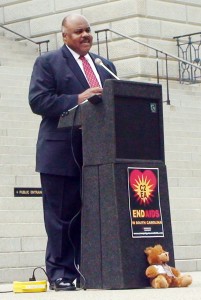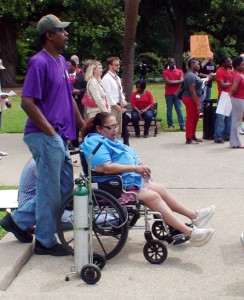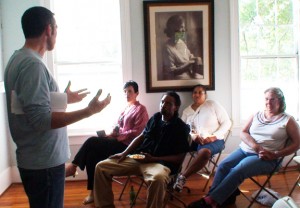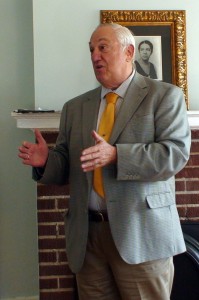By Tom Turnipseed
Columbia, SC
The South Carolina Legislature is considering an anti-immigrant bill much like Arizona’s draconian law. It requires police to check a person’s residency status when stopped or detained for any reason and makes it a crime for illegal immigrants to solicit work. Opponents of the bill say it would lead to racial profiling, marginalize the state’s Hispanic community and polarize the state. On May 28, people who oppose the bill dominated public comment before a Senate Judiciary subcommittee claiming it was un-American and racist.
Bill Bunch, a small-business owner said “It smacks of racism and it smacks of pandering. You’re using these people as pawns for your own political gain.”
I serve on the Board of the S.C. Hispanic Leadership Council. Our Board President, Lad Santiago, told the legislators, “It polarizes our community by allowing for overt distinction of physical attributes and a law that allows this is an affront to all that is fair and just in America.”
Exactly what is fair and just in this land of immigrants? Discrimination and injustices against the “shanty Irish” or the Chinese “yellow peril” because of their race and ethnicity was certainly not fair or just. Over 400 years ago people from Europe migrated to what is now the United States and since then immigrants have come here from every country and region of the world. From the dawn of human history, people have constantly migrated all over the world. But as Hegel said, “We learn from history that we do not learn from history.”
A consensus of historians agree that indigenous people, also known as Native Americans or Indians, were in the Americas at least 10,000 years before the European Christopher Columbus “discovered” America in 1492. Many Native Americans are descendants of people who lived in the southwest and far western region of what is now the United States. Their forebears were there thousands of years before white Europeans came to this continent. They are now called “illegal immigrants” by race-baiting politicians.
When the Spanish arrived in the Americas, Europe was ravaged by war, oppression, religious fanaticism, disease and starvation. Native Americans were generally healthy, and mostly peaceable. Columbus sold his sponsors on the idea he would find a passage to China and the riches of the Orient, but “discovered” the Americas instead, so he decided to pay for his voyage in a commodity he found in ample supply—human lives. He seized 1,200 Tiano Indians from the island of Hispaniola (now Haiti and the Dominican Republic), crammed them onto his ships, and sent them to Spain, where they were paraded naked through the streets of Seville and sold as slaves in 1495. Because Columbus captured more Indian slaves than he could transport to Spain in his small ships, he put them to work as slaves for his family and followers throughout the Caribbean.
It was cheaper to work Indians to death and replace them than keep them alive. In California the native people were forced to work in the fields on a starvation diet. They died from overwork, starvation and disease and were continually replaced, wiping out the indigenous populations.
As a descendant of Choctaw Indians I despise the nationalistic and historically blind rhetoric we hear about immigration.
European conquest of Mexican Native Americans exemplifies such blindness. European Americans under the flag of the United States took the land from these indigenous Americans in the Mexican Wars. Mexico won independence from Spain in 1821, and the new Mexican republic included present-day Mexico and the territory that today constitutes five southwestern states and more territory further north.
In 1835 United States settlers in Texas revolted against Mexico, fought at the Alamo in 1836, and formed their own republic. In the years that followed, the United States pushed farther westward. The imperial doctrine of Manifest Destiny, the belief that God had destined the United States to be bordered on the east and west by the Atlantic and the Pacific Oceans, was used to justify the United States’ encroachment upon Mexican territories. It finally provoked a war in 1846 that enabled the United States to take almost half of Mexico’s territory.
Hard-working Mexicans in the United States had ancestors who lived in the Southwestern part of what is now the United States for thousands of years before there was a United States. Their ancestors were forcibly removed by the United States. Should they be treated as undocumented criminals?
The best solution to the immigration question is comprehensive immigration reform legislation at the federal level that will:
- Provide a path to permanent resident status and citizenship for all members of our communities;
- Reunite families and reduce immigration backlogs;
- Secure the border in a humane way;
- Punish unscrupulous employers who drive down wages and make it hard for honest employers to compete in today’s economy;
- And provide rights to all workers in the United States.
Such Comprehensive Immigration Reform legislation must also be enforced primarily by the federal government. The Arizona and proposed South Carolina laws, in practice, will take even more resources away from state and local law enforcement who need to focus on apprehending real criminals who steal and commit violent crimes rather than on poor and peaceful working people who harvest our crops, construct our homes and do service work for our travel and hospitality industry.
A fair and just America must live the promise we make to the world.
“Give me your tired, your poor,
Your huddled masses yearning to breathe free.”
[Emma Lazarus]
Tom Turnipseed is an attorney, writer and peace activist in Columbia, SC. Read his blog here.







